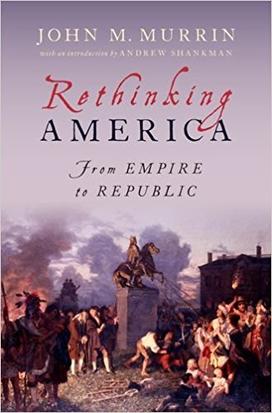Professor John M. Murrin Invites Readers to Rethink America

The author: John M. Murrin, professor of history emeritus, has written more than 50 essays and co-wrote the textbook Liberty, Equality, Power. He is one of the foremost historians on early America.
Opening lines: “Americans have always shared one conviction about their Revolution: It was a good thing for the United States and the entire world. The revolutionary generation believed that its principles would benevolently affect social conditions, agriculture, political economy, the fine arts, and even basic demographic trends. Only now are many of these themes being recovered… The early chroniclers of the Revolution began to lose some of the movement’s context even while quoting directly from its fundamental documents. They explained and defended the Revolution in terms essentially constitutional and political, as the triumph of liberty, equality, and limited government against the menace of irresponsible power and aristocratic privilege—rather feeble dangers, they somewhat paradoxically implied, if only by giving these challenges little real chance of success in America’s unique, libertarian environment, which they found at work in the very first settlements. “
Reviews: "In the last half-century no American historian has thought more deeply about the colonial, Revolutionary, and early national periods than John Murrin … Every serious student of American history should read this book." —Fred Anderson, University of Colorado, Boulder












1 Response
Norman Ravitch *62
7 Years AgoLooking Properly at the American Revolution
What were the American revolutionaries, a fraction of the colonial white population, fighting for: exemption from taxes to uphold the military needs of the British Empire in the face of French and Spanish rivalry; dislike of the evolved British system of government which was that of a constitutional monarchy and a legislature elected largely by and for the landed and commercial elite. They pretended that George III was an absolute monarch with tyrannical goals when actually he was totally loyal to the Glorious Revolution of 1688 and its constitutional developments. They were perhaps not directly represented in Parliament, but neither were most Britons. They were not treated as colonials but as loyal subjects of the king-in-Parliament. The government they devised was a very noble one, but the politicians who ran this government from 1789 up to the present cannot claim any more virtue or ability or high-mindedness than those who ran Britain during the same period. We had slavery; Britain had colonial dependents and treated them and the Irish perhaps worse than Americans treated Negro slaves. Our way of dealing with the Native Americans was about the same as the British way of treating rebellious Africans and Asians and perfectly peaceful Irishmen and women. So, have you ever heard this expressed in a classroom below the university level? I dare say not.